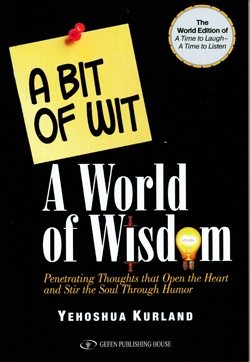By Donald H. Harrison
 SAN DIEGO — There was a happy coincidence between the “then” and the “now” at the Harrison household on a recent weekend. It started after a Shabbat dinner when our 6-year-old grandson, Sky, clambered onto his father Shahar’s lap to read to him a children’s book that had been found on one of the bookshelves. It was Jonah & The Great Fish, which had been adopted, designed and illustrated by Daron Lowe. Nancy and I had purchased the slender volume in 1999 in Hamilton, Bermuda, imagining just such an evening as this one.
SAN DIEGO — There was a happy coincidence between the “then” and the “now” at the Harrison household on a recent weekend. It started after a Shabbat dinner when our 6-year-old grandson, Sky, clambered onto his father Shahar’s lap to read to him a children’s book that had been found on one of the bookshelves. It was Jonah & The Great Fish, which had been adopted, designed and illustrated by Daron Lowe. Nancy and I had purchased the slender volume in 1999 in Hamilton, Bermuda, imagining just such an evening as this one.
I kvelled as Sky navigated such words as “Ninevah,” “disobedience,” “afloat,” “fault,” “reluctantly,” “disappeared,” “prepared,” “caused,” “issued,” “obeyed,” and “wickedness.” I thoroughly enjoyed the retelling of the Bible story as Sky read it aloud for the first time.
 Later that weekend, I dug into a book by Rabbi Yehoshua Kurland that had been sent by Gefen Publishing House for review. Titled A Bit of Wit: A World of Wisdom, it combined some G-Rated jokes with little sermons. The idea was to first get readers laughing, and then to get them thinking.
Later that weekend, I dug into a book by Rabbi Yehoshua Kurland that had been sent by Gefen Publishing House for review. Titled A Bit of Wit: A World of Wisdom, it combined some G-Rated jokes with little sermons. The idea was to first get readers laughing, and then to get them thinking.
To my delight, one of the chapters began with a story about a teacher who was “projecting her own heretical views” on her Sunday school class, challenging students whether they believed the story of Jonah really happened. Little Sarah said she did believe the story, and that when she got to heaven she’d ask Jonah himself. The teacher asked Sarah what would happen if Jonah wasn’t in heaven but in the other place? “Then you ask him,” the child replied.
From there, Rabbi Kurland comments that children are “bright, resourceful and quite perceptive, very often putting us adults to shame.” In a follow-up pun to the story of Jonah, he then expounds upon the ‘Seven C’s of Child Rearing’: conduct (of the adults, whom the children model); cognizance (that our children must be our primary concern); cuddling (because our love and tenderness infuses them with strength); courtesy (even in disciplining our children we should be respectful of them); consolation (we should be willing and able to comfort our children); crisis management (we need to maintain our equilibrium when relationships get stormy), and crying (in this sense, in appreciation to God, for allowing us to say the right thing at the right time.)
Okay, so now that you know Rabbi Kurland’s approach, you can read each chapter with the question, “whatever will he do with this one?”
For example, at the Super Bowl, Bernie spotted a woman sitting next to an empty seat. When no one came to fill it, he inquired of the lady to whom it belonged. It had been her late husband’s, she explained. But didn’t any of her family or friends want to come today? he asked. “No,” she responded, “they all insisted on going to the funeral!”
Okay, so this leads into a series about what?
A) The importance of football.
B) Why the SuperBowl is super
C) How to meet people at sporting events
D) Misplaced priorities.
*
Harrison is editor of San Diego Jewish World. He may be contacted at donald.harrison@sdjewishworld.com